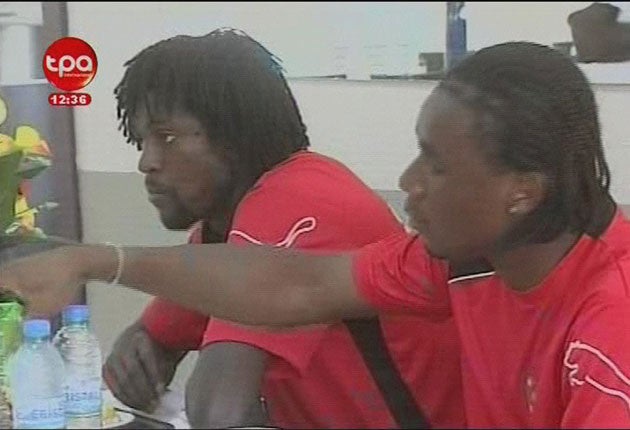Togo withdraw as sport grapples with terror
Three deaths jeopardise African tournament and World Cup

Your support helps us to tell the story
From reproductive rights to climate change to Big Tech, The Independent is on the ground when the story is developing. Whether it's investigating the financials of Elon Musk's pro-Trump PAC or producing our latest documentary, 'The A Word', which shines a light on the American women fighting for reproductive rights, we know how important it is to parse out the facts from the messaging.
At such a critical moment in US history, we need reporters on the ground. Your donation allows us to keep sending journalists to speak to both sides of the story.
The Independent is trusted by Americans across the entire political spectrum. And unlike many other quality news outlets, we choose not to lock Americans out of our reporting and analysis with paywalls. We believe quality journalism should be available to everyone, paid for by those who can afford it.
Your support makes all the difference.The shooting dead of two officials and the driver of the bus carrying the Togo national football squad in an ambush in Angola on Friday has cast a permanent pall over the Africa Cup of Nations football tournament, and raised security doubts about this summer's World Cup in South Africa. With widespread fears that terrorists could target India's staging of the Commonwealth Games in October, this year could be a very jittery one for world sport.
Early yesterday, with the news that the team's assistant coach and its press officer had been mortally wounded along with the driver, and that a goalkeeper was fighting for his life in hospital, it seemed certain that the country would withdraw from the tournament. There were widespread reports late yesterday that its star player and captain, Emmanuel Adebayor of Manchester City, was already on his way home. He told the BBC: "If I am alive, I can still play football tomorrow, and in one year even another Cup of Nations. But I am not ready to pass away now."
Initially, some government officials insisted the team would stay, and play. But a Togo forward, Thomas Dossevi, told the Associated Press in a phone interview that the team planned to withdraw from the tournament and fly out of the country early today. He said representatives met with Confederation of African Football (CAF) officials yesterday to discuss postponing the tournament, but that no decision was made at that time. He said the team would have been willing to play in the tournament if it were postponed. "Our wish is that the beginning of the competition will be delayed to let us bring our dead people home," he said. Finally, it is rumoured, after a long behind-the-scenes argument, the team pulled out.
With matches due to begin on Monday in the region where the attacks occurred, there was even speculation that other teams in their group, possibly Ghana or the tournament's favourites Ivory Coast, could also withdraw. Dossevi said he and his teammates had talked to players from other squads and he thought more teams might pull out: "I can guarantee that if the CAF doesn't want to delay the start of the competition, there will be other teams that won't play."
Most worrying of all for the prospect of international football on the African continent, Fifa, organisers of the World Cup that opens in Johannesburg on 11 June, was swift to express concern. A statement said: "Fifa is in touch with the African Football Confederation and its president, Issa Hayatou, from which it expects a full report on the situation."
The bus was in Angola about six miles from the border of Congo when it was ambushed by gunmen. The region's main separatist group, the Front for the Liberation of the Enclave of Cabinda claimed it was responsible. The attackers – beaten back by the Angolan army or the team's security detail, according to which report is to be believed – fled into Congo after the ambush. There was also confusion over the wounded players and the seriousness of their condition.
Angola's information minister Manuel Rabelais said that eight team members and one Angolan were injured. And Togo coach Hubert Velud said: "I was hit in the arm, but it's nothing compared to what happened to the assistant coach, who took a bullet in the belly, or to the press officer. The goalkeeper Obidale took a bullet in the kidney. We are in shock. This was an act of war. There was a lot of blood and fear in the coach."
Meanwhile, Angola's sports minister Goncalves Muandumba, whose government is hoping the tournament will give the country a chance to show its recovery from decades of war, insisted: "The championship will go on." Indeed it may, but not as intended.
Join our commenting forum
Join thought-provoking conversations, follow other Independent readers and see their replies
Comments